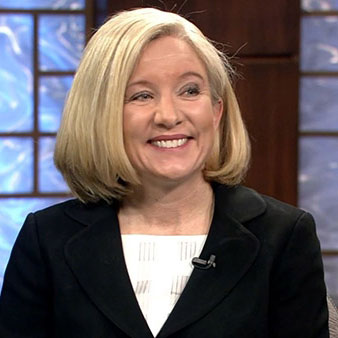When Kathryn Sorenson was director of water services for the city of Phoenix, she was in charge of a massive infrastructure that included 7,000 miles of pipeline.
When she needed information, she often used the resources of the Kyl Center for Water Policy at Arizona State University, which provides research and support for decision-makers.
“They have produced some amazing papers on water security, groundwater management and adjudication reform,” Sorenson said.
“I used the Arizona Water Blueprint all the time,” she said of the online visualization tool that uses maps and data sets to show a holistic view of water in the state.

Now, Sorenson is part of the Kyl Center team, where she recently was named director of research. The Kyl Center is part of the Morrison Institute for Public Policy.
“I’m so excited to contribute to what the center has already done,” she said.
"It's exciting to be able to bring to ASU my experience leading large municipal water systems.
“Access to clean water is a fundamental need of every person on Earth, and yet we're still so far from fulfilling that need, even in Arizona. I want the research and teaching I do at ASU to help us overcome the barriers that prevent people from having secure access to safe water.”
Sorenson was director of water services for Phoenix for seven years, and before that was director of the Water Resources Department for the city of Mesa. In addition to directing research in the Kyl Center for Water Policy, she will be a professor of practice in the School of Public Affairs and will contribute to the Julie Ann Wrigley Global Futures Laboratory.
She answered some questions from ASU Now:
Question: What did you do as director of water services for the city of Phoenix?
Answer: I was responsible for making sure that about 1.7 million people had safe, clean water in their taps 24/7, 365 days a year, in the correct quality and the correct pressure, and for making sure that those deliveries were reliable.
The job entailed five water-treatment plants, hundreds of pumping stations, wells and pressure gauges, and 7,000 miles of pipeline, as well as 430,000 customer connections, each of which has to work all of the time.
In addition, I oversaw 1,500 employees, $700 million in annual appropriations and a $2 billion capital improvement program.
Q: What are some of the water issues facing Arizona?
A: Arizona depends heavily on the Colorado River, and it is over-allocated, meaning we collectively take more water from the system than nature puts in. To make matters worse, the Colorado River basin has been experiencing a prolonged drought of more than 20 years.
When you take the longer term view, a lot of communities in Arizona are heavily dependent on fossil groundwater supplies. Once you pump them out, they’re gone forever. There are real problems looming when it comes to groundwater management and the Colorado River.
Q: What topics will you be researching?
A: When stakeholders, managers and elected officials understand where water flows, who it goes to and what the societal, economic and ecological costs are, then they have the foundation to make sensible water-management decisions. I see a lot of our research focusing on that basic premise. Water equity is a big piece of that, making sure there is a level playing field in terms of access to supplies.
Q: What changes have you seen in water policy and management over the years?
A: I’ve seen positive ones. When I started in this field, it was a very small group of folks that were making the most important, most fundamental decisions about water allocation in this state. That group over time has become larger, more inclusive and more diverse, and I think that’s hugely important. We only make good decisions when we have many different perspectives at the table.
Q: What’s important for Arizonans to know when they turn on the water tap?
A: I want people to understand that the delivery of safe, clean water in our communities really is the foundation of public health, economic opportunity and quality of life.
The COVID-19 pandemic has really brought that into focus. When the CDC came out with the recommendation early in 2020 about frequent handwashing, one of the first things we did (in the city of Phoenix) was to make sure that the taps were on for everyone in the community, even those who had been disconnected for nonpayment.
Because the water industry has been successful, we are many generations removed from a time when babies died of waterborne diseases. That’s not in our collective memory any more. So while I think it is taken for granted, clean water really is the foundation of public health.
Top image courtesy of Pixabay.
More Law, journalism and politics
Can elections results be counted quickly yet reliably?
Election results that are released as quickly as the public demands but are reliable enough to earn wide acceptance may not always be possible.At least that's what a bipartisan panel of elections…
Spring break trip to Hawaiʻi provides insight into Indigenous law
A group of Arizona State University law students spent a week in Hawaiʻi for spring break. And while they did take in some of the sites, sounds and tastes of the tropical destination, the trip…

LA journalists and officials gather to connect and salute fire coverage
Recognition of Los Angeles-area media coverage of the region’s January wildfires was the primary message as hundreds gathered at ASU California Center Broadway for an annual convening of journalists…


